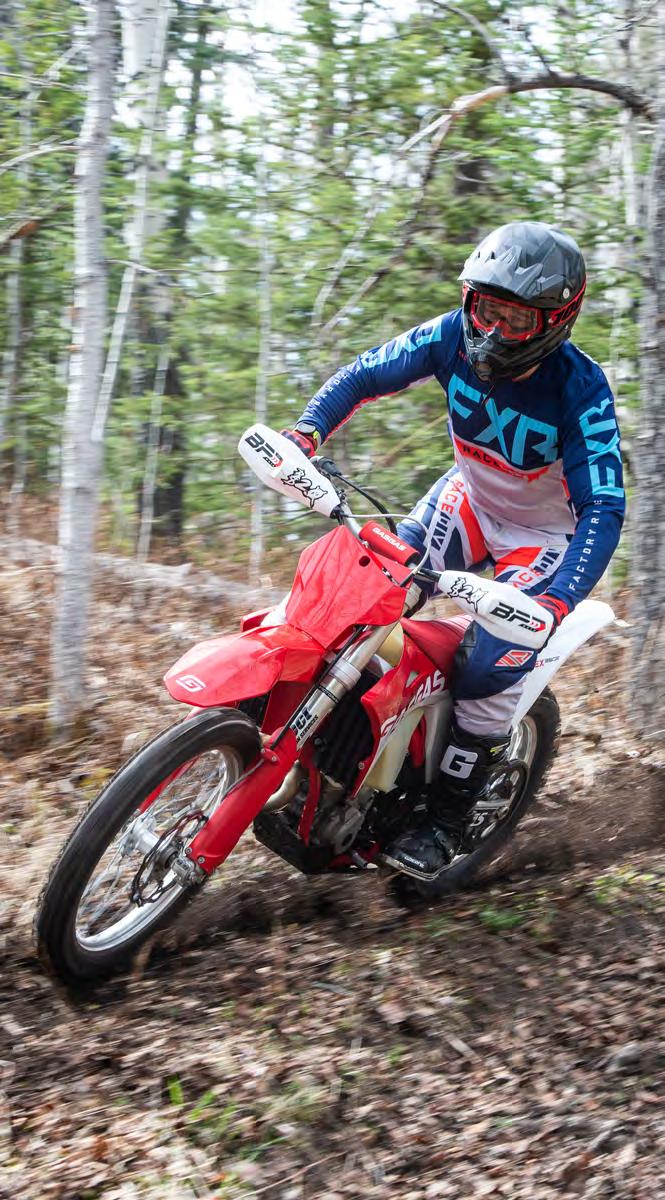
4 minute read
Frankly Speaking | Frank Wood
Dick Mann (1934 – 2021)

Ihad something else planned for you this month but the passing of Dick Mann and the memories that followed have taken precedence.
I never took the opportunity to speak with Dick Mann, having seen him just once up close at a dirt track half-mile race in Columbus, Ohio. He seemed so much older than the rest of the paddock; didn’t seem to fit the mould of the younger more effervescent riders he would compete against. I was especially sorry for that missed opportunity after speaking with Paul Germain. “You should’ve met him,” he said to the point, “You’d have a different opinion. I met him twice.” Germain recalls, “The first time was at Daytona at rider sign-in. He was standing alone in the hallway looking at the old black and white photos of races and racers from the old days and we started chatting. He was so meek and mild mannered and naturally didn’t know me from Adam and it didn’t matter, it was like I was just one of the guys.” Paul wastes no time in conversation before moving on to their second meeting. “We were at Barber and it was the same thing. I don’t think he remembered me from Daytona but he was the same guy. I was asking him questions regarding my BSA Trackmaster dirt track racer and he helped me out a lot. He knew the motor and the chassis inside out, and it’s funny, you know, as a racer he didn’t look fast, he wasn’t flashy he just went out there and got the job done. He was an observer, he was unassuming, he was a prince of a guy.”
After three years as an amateur Dick Mann entered the professional ranks in 1955 but it wasn’t until 1959 that he scored his first AMA national race win; the track was the Peoria TT and the motorcycle was a BSA. He scored a number of his victories on an assortment of different brands: two TT wins on Matchless, a short track win on an Ossa, his one and only two-stroke road race victory on a Yamaha, his final season on Triumph and of course his big win for Honda in the Daytona 200 in 1970.
Mann is most often associated with the BSA brand and yet it was the fact that BSA had not renewed Mann’s contract after the 1969 season that made him available for the Honda seat in 1970. BSA saw the error of their ways and re-signed Mann for 1971 and he promptly rewarded them with a win at the season opening Houston TT race and most importantly just over a month later a victory at the Daytona 200. It was a great start to the season and that, coupled with a consistent flat track effort throughout the campaign as well as two more road race wins, would see him capture the No. 1 plate. That would be the last time to date that a British bike would carry the lonely single digit.
Hailed as the first rider to score a Grand Slam by winning races in all five of the AMA disciplines – short-track, TT, half-mile, mile and road race – Mann took almost his entire career to achieve that. Although he won at TT, road race and half-mile within his first three years as a pro, Mann took a full ten years before he captured his short track win. That win was on an Ossa and to celebrate the factory created the Dick Mann Replica short tracker, available through Ossa dealers. In the second last win of his career, eighteen years after he started, Dick Mann finally completed the grand slam winning the Homewood mile late in the 1972 season, one year before retirement.
Much more than just a Grand National competitor, Mann excelled in other facets as well. He rode for the USA team in the ISDT in 1973 through ‘75 capturing a bronze medal in ‘75 mounted on a factory supported Ossa. It was also on an Ossa that Mann set another benchmark. In 1970 the AMA began sanctioning a motocross national championship and at the very first event Mann took victory. He was 36 years old at the time.
Mann was also known for his concerns about rider safety and monetary rewards and was suspended twice by the AMA for standing up for his convictions, yet he served the AMA as an advisor after his retirement. Through the latter part of his life Dick Mann was keenly involved with the American Historic Motorcycle Racing Association.
His career spanned an era from Resweber to Roberts, from the post war growth through to the ‘Golden Age’ of Grand National racing; it just may be that Dick Mann was America’s Greatest of All Time. IM










